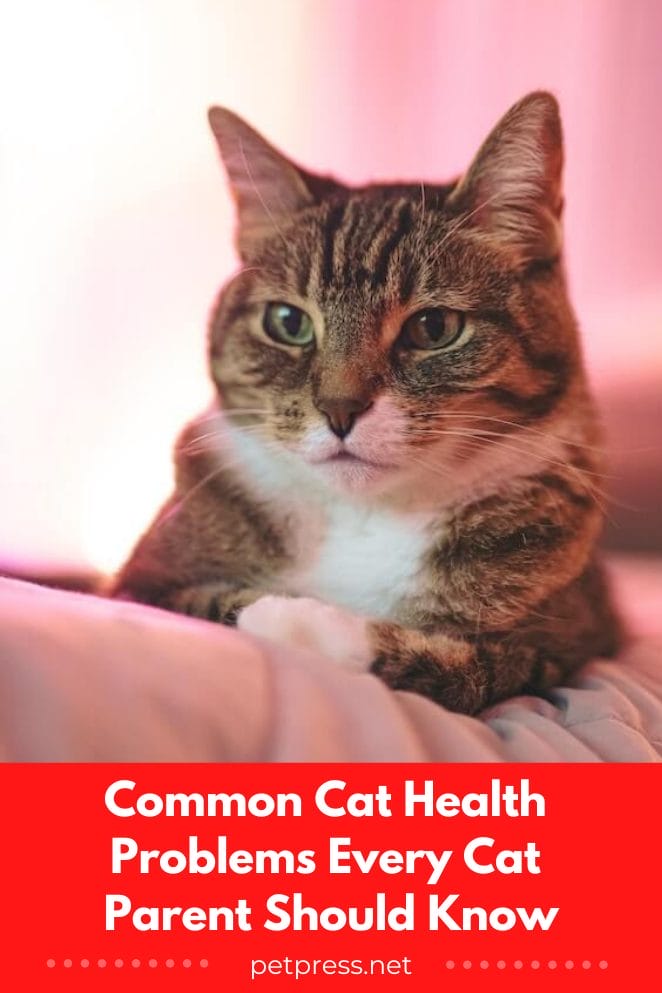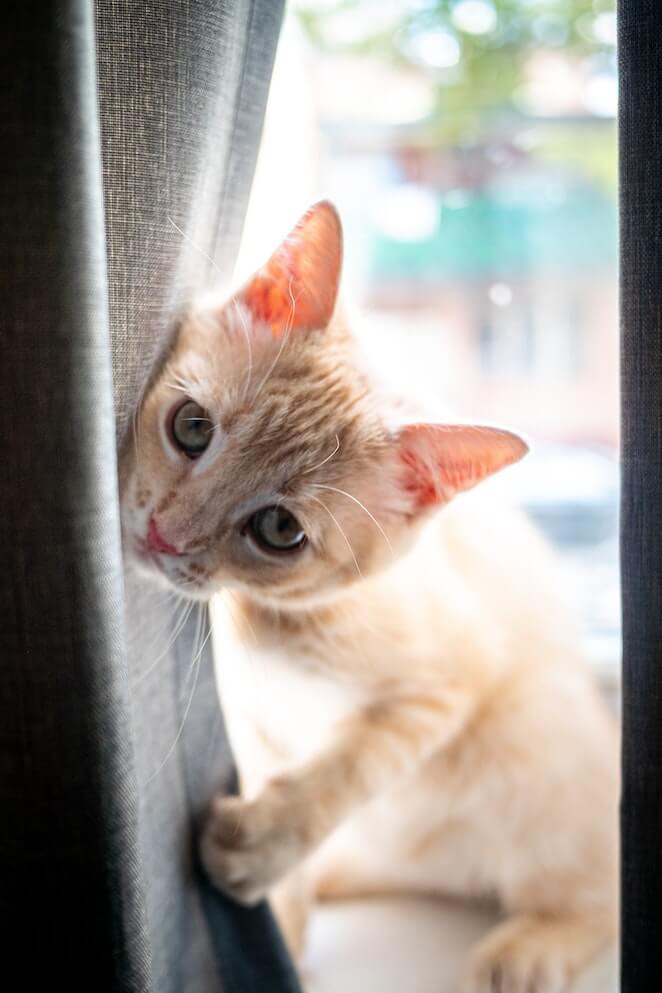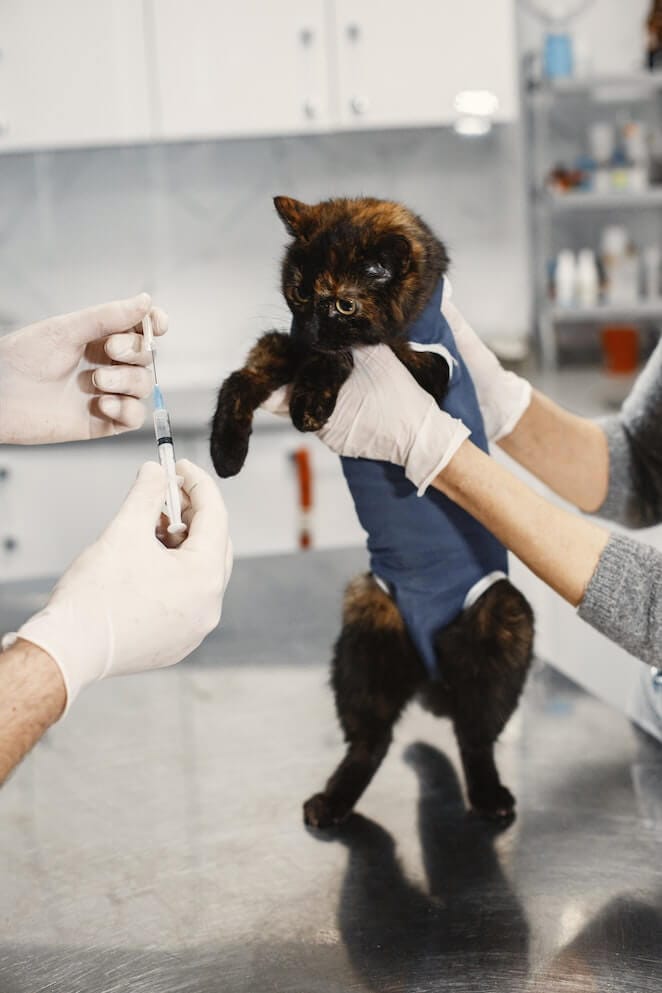
Pet cats need regular check-ups and preventive care just like humans do. Cats can suffer from a variety of health issues.
That’s why it’s important for owners to pay attention to any changes in their cat’s behavior or physical condition that could signal an underlying issue.
Additionally, cats should be vaccinated against common illnesses like feline distemper and rabies.
As part of your pet cat’s basic health plan, you should also make sure they have access to clean water and nutritious food.
Regular exercise is also essential for maintaining good overall health; indoor cats benefit tremendously from playtime with interactive toys or laser pointers.
Overall, pet cats need just as much care and attention as any other furry family member.
What Are The Signs of an Unwell Cat?

It’s not always easy to tell when your cat isn’t feeling up to par.
Your kitty may hide any illness she is feeling, but there are some common signs that something is wrong.
From physical clues like changes in appetite or activity level to behavioral changes, here are five of the top signs it’s time for a trip to the vet.
1. Change in Appetite – Cats who suddenly go off their food or drink more water than usual may be unwell and should be checked out by a veterinarian.
2. Vomiting & Diarrhea – If your furry friend is having trouble keeping their meals down, they could have something much more serious than an upset stomach.
3. Lethargy & Weakness – Cats who sleep much more than usual or have difficulty jumping on a favorite perch can indicate an underlying health issue.
4. Weight Loss – Sudden weight loss could be a sign of several different conditions and should not be ignored.
5. Grooming Habits – A decrease in grooming habits such as excessive shedding, bald spots, or bad breath could all signal an unhealthy cat.
Most Common Cat Health Problems
Cats are beloved and mysterious creatures, often keeping their health struggles out of sight.
Though they try to hide it, cats can suffer from a variety of ailments that require medical attention.
Here’s a closer look at the 10 most common cat health problems.
1. Feline Lower Urinary Tract Disease (FLUTD):
This is a broad term used to describe various diseases that affect the lower urinary tract in cats, such as bladder inflammation or blockage in the urethra.
Symptoms include straining to urinate, blood in urine, excessive licking of genitals, and frequent trips to the litter box.
2. Fleas and other parasites:
Fleas can cause skin irritation and allergic reactions in cats, while other parasites like ticks, mites, and worms can cause digestive problems.
Regular baths and spot-on treatments help protect cats from parasites. Regular grooming sessions are also important.
3. Skin allergies:
Allergies to food, pollen, or other substances can cause skin irritation in cats, presenting as redness, itchiness, and scabs on the skin.
Treatment includes eliminating exposure to allergens, medications, and special diets.
4. Urinary tract infections:
These are caused by bacteria that enter the urinary tract and cause inflammation of the bladder or urethra. Symptoms include frequent urination, pain when urinating, or straining to urinate.
5. Diabetes mellitus:

This is a disease where the body doesn’t produce enough insulin to regulate blood sugar, which can lead to dehydration, weight loss, and urine that has a sweet odor.
Symptoms include increased thirst and urination, as well as changes in appetite.
6. Hyperthyroidism:
This is when the thyroid gland produces too much of the hormone thyroxine, leading to weight loss and increased appetite.
Symptoms include hyperactivity, coat problems, and skin infections.
7. Obesity:
Just like humans, cats are prone to obesity if they eat more calories than they burn off through activity.
Overweight cats are at risk for many other health problems such as diabetes and heart disease.
8. Heart disease:
Cats can suffer from a variety of heart diseases including hypertrophic cardiomyopathy (thickening of the heart muscle) and feline infectious peritonitis (inflammation of the lining of the heart).
Symptoms include coughing, shortness of breath, and lethargy.
9. Liver disease:
Cats can suffer from a variety of liver diseases, including hepatitis and cirrhosis which can cause poor appetite, vomiting, jaundice, or weight loss.
10. Feline Immunodeficiency Virus (FIV):
This is a virus that weakens the immune system in cats, making them more prone to infections and other illnesses.
It is transmitted through bites from an infected cat, so it’s essential to keep your cat away from strays or unknown cats.
Final Words

Now that you know about the 10 most common cat health problems, make sure you’re prepared if your furry feline friend ever experiences one of them.
Even if you have one of the healthiest cat breeds, regular checkups with your vet are incredibly important.
Taking care of our cats is a priority – after all, they’ve been taking care of us since ancient times! With proper attention and care, cats will live long and healthy lives.
- 7 Dog Breeds With Webbed Feet And Why Do They Have Them - July 19, 2023
- 10 Best Fish For Small Tanks That Make Perfect Pets - July 18, 2023
- How to Breed Guinea Pigs: A Detailed Guide - July 17, 2023


GIPHY App Key not set. Please check settings